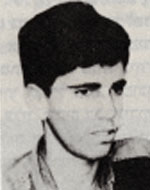Yanai, Nachshon
Nachshon, son of Naomi and Jacob, was born on May 8, 1954, at Kibbutz Gvulot, where Kibbutz Gvulot was a settlement, and Nahshon, from his early childhood, knew the taste of the shelter. After graduating from elementary school, he moved to the agricultural high school in Kfar Galim, where he studied agricultural sciences, and Nachshon as a child told his kibbutz members: “Nachshon was one Of us, but a little different. He had difficulties in being absorbed in the group, but he was nevertheless a “member”. He was typical of the enthusiasm of every little thing. A kind of lively and lively enthusiasm and curiosity. “His teachers wrote about him:” Nachshon loved the work of the land. As a worthy son of the kibbutz, he was responsible for his actions, and at the same time he was well integrated into the tricks of his friends. As a sensitive boy, he was sometimes subjected to extreme moods sometimes, from laughter and cheerfulness to sadness and even tears. There was some pure innocence in him that did not spoil the pressure of the environment, and his goodness was known to all. Nachshon was deeply preoccupied with the problem of the kibbutz’s declining values. He wanted to correct the world, or at least his own small world. “Nachshon was drafted into the IDF in early November 1972 and assigned to the infantry brigade of the Golani Brigade. “Nachashon had a strong desire to enlist in a combat unit, even though he knew the difficulties ahead of him, and when we came to visit him when he finished basic training, we found him mature and confident.” In the Yom Kippur War he served in the Golan Heights. In one of his last postcards he sent home, he wrote: “For your information, I am still alive and well, and more than that, I feel great. On the 22nd of Tishrei 5740 (October 22, 1973), when he participated in the Battle of the Hermon, he was hit by sniper fire and fell. He was brought to eternal rest in the cemetery of Kibbutz Ga’aton. Survived by father, mother and sister. After his fall, he was promoted to corporal. In a letter of condolence to the family, his commander wrote: “Nahshon fought as someone who knows what he is fighting for – bravery, heroism, dedication and sacrifice. In his memory, the family published a booklet with photographs of him, fragments of his letters, and friends’ comments on his character
